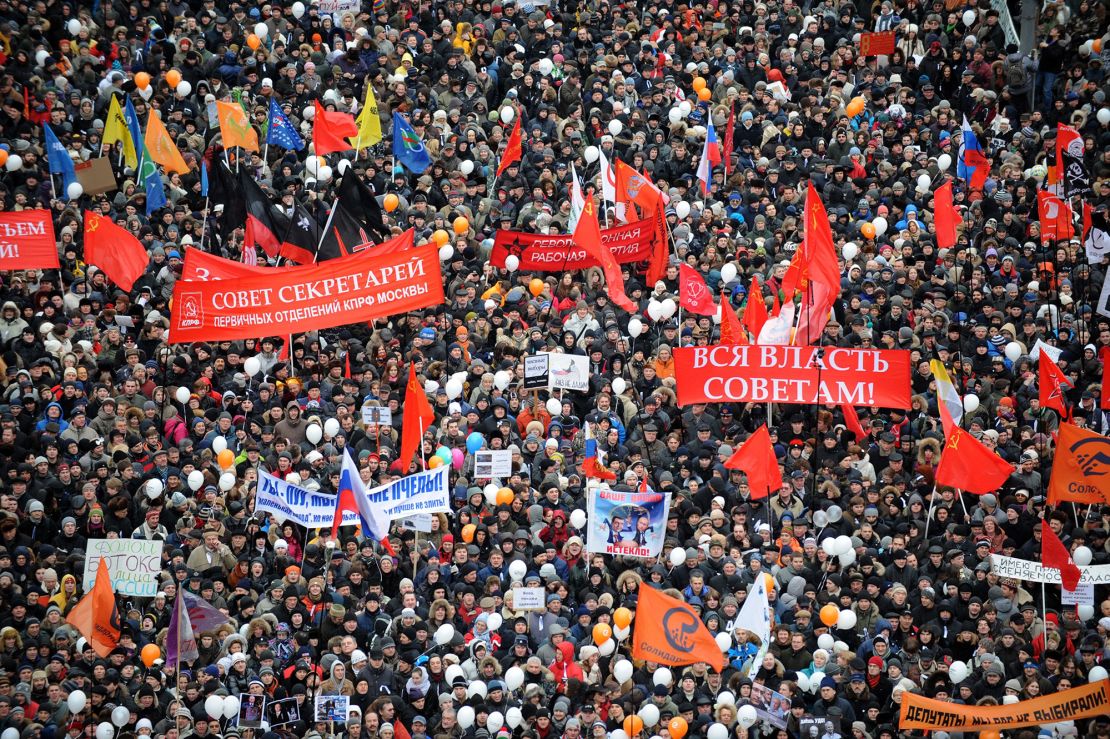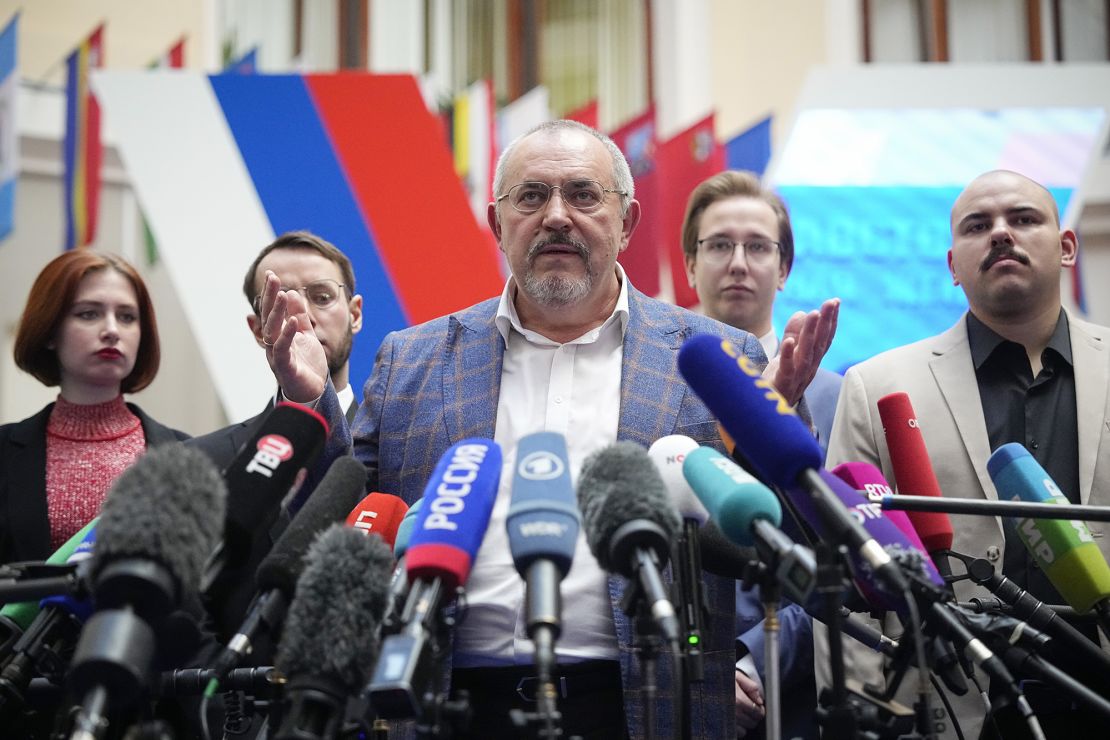Editor’s Note: Ekaterina Kotrikadze is a news director and anchor for the independent Russian TV channel Dozhd (TV Rain). The channel shut down in March 2022 and was relaunched from Europe in July 2022. Kotrikadze lives and works in the Netherlands. The views expressed in this commentary are her own. Read more CNN Opinion.
CNN
—
Russia just wrapped up what officials would have us call an election. But of course, there are no elections in Russia anymore. Instead, this is the reappointment of Vladimir Putin to the highest position in the largest country in the world.
In 2003, when Putin was still a young president, I was a student at the Faculty of Journalism at Moscow State University. This was my first parliamentary election. I remember making my way to participate in the voting through the snowdrifts of winter Moscow, freezing.
But it made sense — I was going to give my vote to the liberal Union of Right Forces (URF) party, one of the leaders of which was Boris Nemtsov. Politician Vladimir Kara-Murza ran for the same party. The URF lost then and did not get into parliament.
Nevertheless, opposition continued to exist in the country, and political competition was strong and interesting. I loved bright election campaigns, and even despite the obvious movement towards autocracy, the Kremlin’s competitors were relatively free to act.
They couldn’t win elections, but they could participate, they could speak to independent media and convey their ideas to a significant audience. They could hold rallies and live in Russia.
Eight years later, and now established in my journalism career, I called Nemtsov and asked for an interview during the 2011 parliamentary campaign. We met at one of the polling stations in the center of Moscow. Nemtsov was inspired: he was talking about observers catching violations and falsifications, he believed that the authorities would be held responsible.
The allegations of electoral fraud sparked the largest protests in modern Russian history. Tens of thousands took to the streets.

Today such a thing is impossible to imagine. But all these people didn’t disappear — they just went silent.
In 2015, Nemtsov was shot in the back a short distance from the Kremlin walls. In 2023, Kara-Murza was convicted of “treason” and sent to a maximum security colony for 25 years.
I can no longer live and work in my country; with the outbreak of a full-scale war in Ukraine and the introduction of military censorship, the absolute majority of independent media were banned, and journalists including myself were facing criminal charges.
My job in the new reality is to inform Russians about what is happening in Russia, while being in Amsterdam. I can’t go to the polling station, I can’t talk to voters, I can’t ask questions of government officials.
The TV channel Dozhd (TV Rain), where I work, has been declared not only a “foreign agent,” but also an “undesirable organization,” which means that for just one interview with Dozhd or even reposting a video of Dozhd, any citizen of Russia can be charged in a criminal case.
Working in such circumstances is, at first glance, insane, and at the beginning of my forced emigration it seemed that such a thing was simply impossible. But it turned out that you can adapt to anything. We learned how to get videos from all over Russia, we learned how to invent relatively safe ways to interview people from Russia, and it became possible to talk about Russia from outside its borders.
The elections in Russia took place without a single influential competitor to Putin. It seems there is no need to even imitate democracy anymore. Minutes after polls closed on Sunday, the Russian Central Election Commission (CEC) said Putin was in the lead with 87.9% of the vote, with about a quarter of the ballots tallied.
The result means Putin will rule until at least 2030, when he will be 77. That will make him Russia’s longest-serving leader since Soviet dictator Joseph Stalin, if he serves out his fill term.
Russia is experiencing this shame in depression and grief. A month before that start of the balloting, it appeared that 47-year-old Alexey Navalny was killed in a penal colony beyond the Arctic Circle. I say “killed” because in my view this crime is obvious. For almost 300 days, the leader of the Russian opposition, political prisoner number one, was kept in solitary confinement, which is physically almost impossible to withstand. Moreover, they withheld Navalny’s body from his mother for a week.
Since he was already poisoned once and miraculously did not die, this time too the suspicions of poisoning or other external influence — despite his death certificate stating he died from natural causes — are more than justified. With his death, millions of Russians lost their last strength. The ground went away from under their feet.
A few weeks before Navalny’s death, we witnessed an amazing phenomenon. Politician Boris Nadezhdin announced his desire to participate in the presidential elections. This man is from the past, from the very party for which I voted in 2003. However, over the years he turned into a “system liberal”: he regularly appeared on state television channels and allowed propagandists to use him as a whipping boy. He is careful and flexible. He has told me himself that he is not a hero or a fighter, that he makes compromises and is afraid.

But this man found the courage to speak out against the war in Ukraine. This alone was enough to prompt queues of people all over Russia — they were waiting in long lines just to support Nadezhdin’s presidential application. The procedure in Russia doesn’t allow a candidate to be placed on ballots without the signatures of citizens from different regions.
The Central Election Commission of Russia, of course, did not allow Nadezhdin to participate in the elections. But the queues have already taken place; this mistake has already cost the Kremlin dearly. Thousands of people who are against Putin saw each other and acknowledged they were not alone. This feeling intensified during Navalny’s funeral on March 1, when a huge crowd came to the cemetery despite threatening police cordons.
Importantly, despite the most severe repressions in Russia, there is still the internet. Yes, Facebook, X and Instagram are banned, but young Russians know how to use a VPN. In addition, videos from smartphones immediately appear in Telegram chats. YouTube is still not blocked in Russia, and it is YouTube that has become the new TV for independent journalists and politicians.
Get Our Free Weekly Newsletter
The longer Putin rules the country, the less of a trace remains of former freedoms, of democracy, which seemed inevitable in the early 1990s. While we cannot make the upcoming elections free, we can cover this circus as honestly as possible.
And our viewers are growing; in February alone, 22 million people watched TV Rain, according to YouTube analytics. This gives us hope. Just like the queues for Nadezhdin. Just like Navalny’s dream of a “beautiful Russia of the future.”
We know that we cannot give up.
Editor’s Note: This piece has been updated with initial election results.
Credit: Source link




